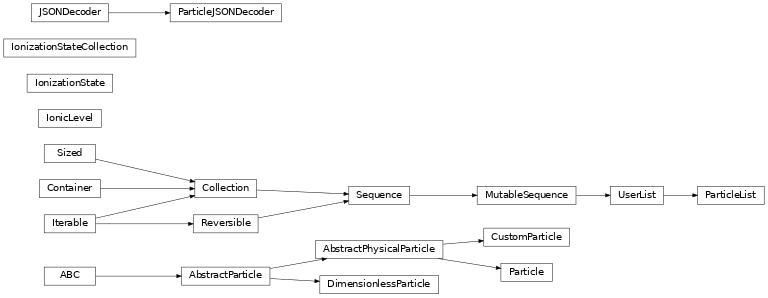Particles (plasmapy.particles)
Introduction
The particles subpackage provides access to information
about atoms, ions, isotopes, and other particles.
Submodules
Examples
See Also
The mendeleev Python package provides access to properties of elements, isotopes, and ions in the periodic table of elements.
API
Sub-Packages & Modules
Functions that retrieve or are related to elemental or isotopic data. |
|
Data used in constructing |
|
Decorators for |
|
Collection of exceptions and warnings for |
|
Objects for storing ionization state data for a single element or for a single ionization level. |
|
A class for storing ionization state data for multiple elements or isotopes. |
|
Functions that are related to nuclear reactions. |
|
Classes to represent particles. |
|
Collections of particle objects. |
|
Functionality for JSON deserialization of particle objects. |
|
Functions that deal with string representations of atomic symbols and numbers. |
Classes
An abstract base class that defines the interface for particles. |
|
Base class for particles that are defined with physical units. |
|
|
A class to represent custom particles. |
|
A class to represent dimensionless custom particles. |
|
Representation of the ionic fraction for a single ion. |
|
Representation of the ionization state distribution of a single element or isotope. |
|
Describe the ionization state distributions of multiple elements or isotopes. |
|
A class for an individual particle or antiparticle. |
|
A custom |
|
A |

Functions
|
Return the number of protons in an atom, isotope, or ion. |
|
Return the atomic symbol. |
|
Return the charge number of a particle. |
|
Return a list of isotopes of an element with an isotopic abundances greater than zero, or if no input is provided, a list of all such isotopes for every element. |
|
Return the electric charge (in coulombs) of a particle. |
|
Return the name of an element. |
|
Return the half-life in seconds for unstable isotopes and particles, and |
|
Return a |
|
Return the ionic symbol of an ion or neutral atom. |
|
Return |
|
Return the symbol representing an isotope. |
|
Return the isotopic abundances if known, and otherwise zero. |
|
Deserialize a JSON document into the appropriate particle object. |
|
Deserialize a JSON string into the appropriate particle object. |
|
Return a list of all known isotopes of an element, or a list of all known isotopes of every element if no input is provided. |
|
Get the mass number (the number of protons and neutrons) of an isotope. |
|
Parse a molecule symbol into a |
|
Return the nuclear binding energy associated with an isotope. |
|
Return the released energy from a nuclear reaction. |
|
Convert particle-like arguments into particle objects. |
|
Return the mass of a particle. |
|
Return the symbol of a particle. |
|
Find the reduced mass between two particles. |
|
Return a list of all stable isotopes of an element, or if no input is provided, a list of all such isotopes for every element. |
|
Return the standard (conventional) atomic weight of an element based on the relative abundances of isotopes in terrestrial environments. |
Variables & Attributes
A |
|
A |
|
A |
|
A |
|
An |
|
An |
|
A |
|
A |
|
A |
